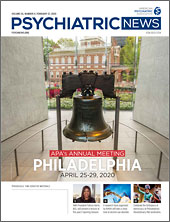Sessions on Psychotherapy: State of the Art and Considerations for Future
Many of the complex issues pertinent to the practice of and research in psychotherapy are the focus of more than three dozen sessions at this year’s Annual Meeting. Here are just some of the psychotherapy-related sessions on the schedule. Check the APA Meetings App for the latest information. Additional registration is required for courses.
SATURDAY, APRIL 25
8 a.m.-Noon
Treating Complicated Grief in Practice Settings (Course)
M. Katherine Shear, M.D., Sidney Zisook, M.D., Stephen Cozza, M.D., Alana Iglewicz, M.D.
1 p.m.-2:30 p.m.
Change During Psychodynamically Oriented Treatment
Jennifer Downey, M.D., Debra Katz, M.D., Michael Stone, M.D., Richard Hersh, M.D., Eric Plakun, M.D., Vincenzo Di Nicola, M.D., Ph.D.
SUNDAY, APRIL 26
8 a.m.-9:30 a.m.
Cognitive Behavior Therapy for Suicidal Behavior
Jesse Wright, M.D., Judith Beck, Ph.D., Donna Sudak, M.D.
8 a.m.-10 a.m.
Caucus on Psychotherapy Grand
Ballroom, Notary Hotel
10 a.m.-11:30 a.m.
The Relationship Between Neurobiological and Psychodynamic Determinants of Personality
Saul Levin, M.D., M.P.A., Otto Kernberg, M.D., Mark Solms, Ph.D., Dragan Svrakic
1 p.m.-2:30 p.m.
Acceptance and Commitment Therapy (ACT) for Psychiatric Clinicians: The Basics and Beyond
Kirk Strosahl, Ph.D., Debrin Goubert, M.D., Laura Roberts, M.D., M.A.
Removing Racial Blind Spots: Making Use of Challenges and Opportunities While Promoting (E)Quality in Psychotherapy and Clinical Supervision
Constance Dunlap, M.D., Flavia De Souza, M.D., M.H.S., Ebony Dennis, Psy.D., Jessica Isom, M.D., M.P.H., Myra Mathis, M.D.
MONDAY, APRIL 27
8 a.m.-Noon
Psychodynamic Therapy for Personality Disorders: Transference-Focused Psychotherapy Extended (Course)
Eve Caligor, M.D., Otto Kernberg, M.D., Frank Yeomans, M.D.
1 p.m.-2:30 p.m.
Social Psychopharmacology:
A New Era of Psychedelic-Assisted Group Therapy and Support
Alexander Trope, M.D., M.Sc., Chris Stauffer, Elizabeth Nielson
TUESDAY, APRIL 28
8 a.m.-9:30 a.m.
Cognitive Behavior Therapy: Troubleshooting Common Challenges
Jesse Wright, M.D., Judith Beck, Ph.D., Donna Sudak, M.D.
Managing Difficult Transferences and Countertransferences
Holly Crisp, M.D., Glen Gabbard, M.D.
Who Is the Psychiatrist of the Future?
Psychotherapeutic Expertise in Psychiatric Consultation to Integrated Care
David Mintz, M.D., Madeline Lansky, M.D., Sherry Katz-Bearnot, M.D., Elizabeth A. Greene, M.D.
8 a.m.-Noon
Treating Narcissistic Personality Disorder: Transference-Focused Psychotherapy (Course)
Frank Yeomans, M.D., Otto Kernberg, M.D., Eve Caligor, M.D., Diana Diamond, Ph.D.
10 a.m.-11:30 a.m.
Psychotherapy in Psychiatry—2020:
Reintegrating and Unifying Perspectives
Ferda Sakman, M.D., David Mintz, M.D., Alyse Eytan, M.D., Guy Cameron Williams, M.D., Seamus Bhatt-Mackin, M.D.
1 p.m.-2:30 p.m.
New Directions for Cognitive Behavior Therapy for Mood Disorders
A. John Rush, M.D., Paul Grant, Ph.D., Michael Thase, M.D., Jesse Wright, M.D., Donna Sudak, M.D.
1 p.m.-2:30 p.m.
Dynamic Therapy With Self-Destructive Borderline Patients: An Alliance-Based Intervention for Suicide
Eric Plakun, M.D., Samar Habl, M.D.
1 p.m.-5 p.m.
Interpersonal Psychotherapy for Posttraumatic Stress Disorder (Course)
John Markowitz, M.D.

